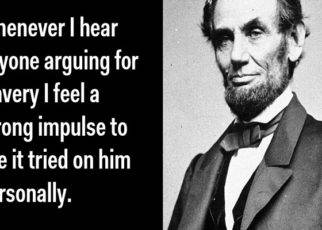James McPherson has written seven interesting and powerful essays on the subject of Abraham Lincoln and the Civil War entitled Lincoln and the Second American Revolution. The seven essays that make up this book contain a lot of interrelated views of Lincoln and his times. As McPherson mentions, most American historians and politicians feel a need to “Get right with Lincoln.” Lincoln is the subject of more writing than any other American political figure. This alone makes a study of Lincoln not only more difficult than studying a figure of less prominence, but there are other complicating factors as well.
One of the most frustrating things about studying Lincoln is that there are clear contradictions in his own thought from different periods. During the war his policy shifts rapidly, and is controlled by the circumstances of trying to court the border states to remain in the Union, followed by what seemed a real possibility of losing the war. He eventually came to see emancipation as the answer to his overarching goal of winning the war and maintaining the Union. This step deprived the South of much of its primary labor force, and added thousands upon thousands of black soldiers to the Union ranks. It is the realities of his times that force Lincoln to choose between ideals and real goals.
It is highly unlikely that he intended directly to increase the power of the Presidency or the Federal government over the States, but rather that these shifts in America’s power structure resulted from the circumstances. Lincoln candidly admitted to being controlled by circumstances more so than being in control of them.
Add all these factors to the overwhelming amount of Lincoln scholarship available, and the picture of Lincoln can become about as clear as mud. McPherson’s essays go a long way towards clearing some of the waters, and offer about as an objective view of Lincoln and some of the events of his lifetime as any that can be found. The seventh essay entitled “Liberty and Power” is perhaps the most striking. The questions addressed here are big questions of the Civil War era.
It is the circumstance of leading a nation broken by extreme exercise of the classic interpretation of the federal system, and the moral belief that slavery was wrong that combined to bring about a revolution in how Americans viewed the issue of Liberty and Power. The Civil War nearly destroyed the concept of States Rights under the old federal system, although they had a brief and feeble resurgence as reconstruction wound down. The new national system consisted of a federal government as the watchdog of human rights throughout the nation. The States were greatly weakened, and new precedents were set. The old Whiggish fear of central power was sacrificed for a belief that Liberty for the freedmen was more precious than the check upon the central power that the States had formerly represented.





